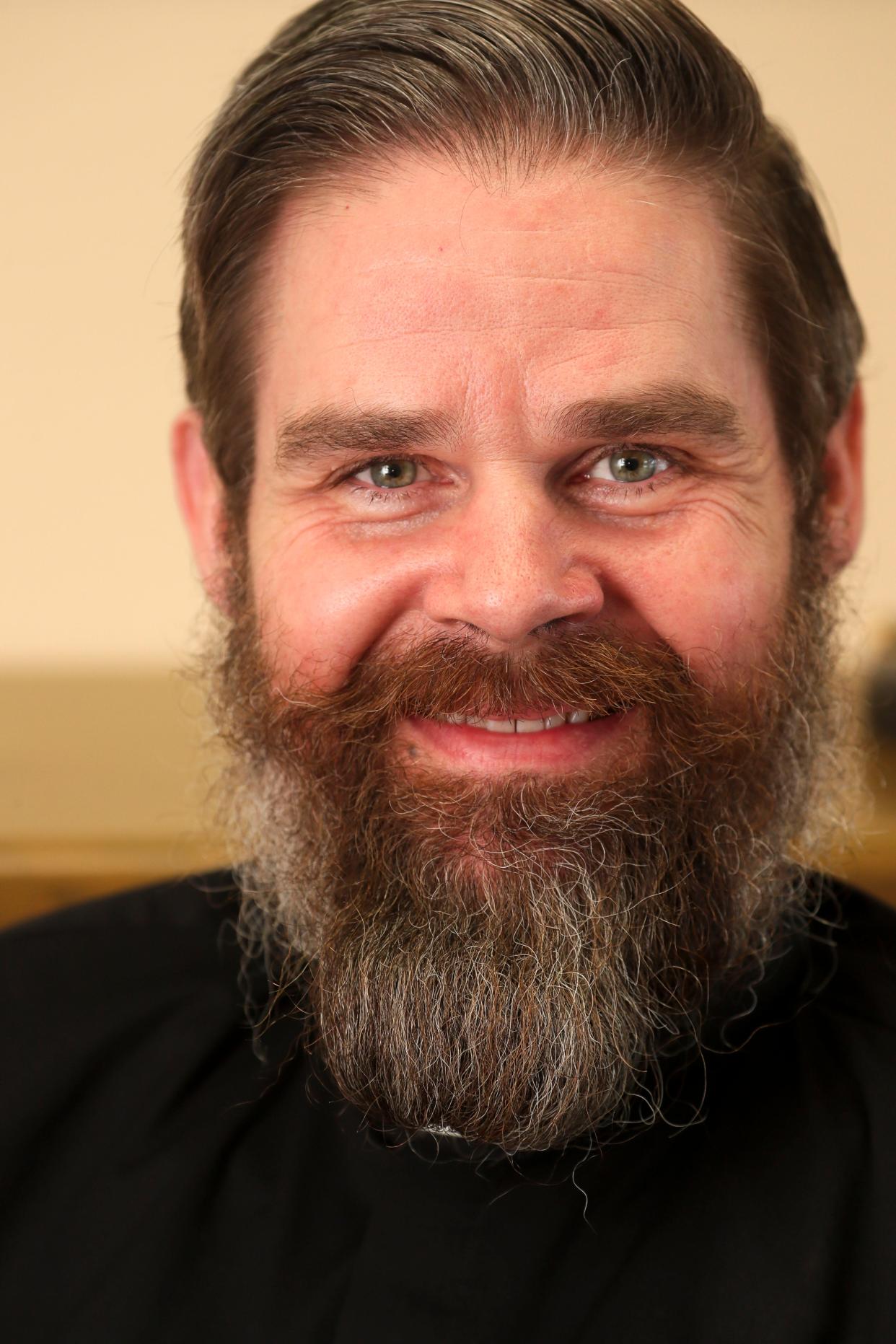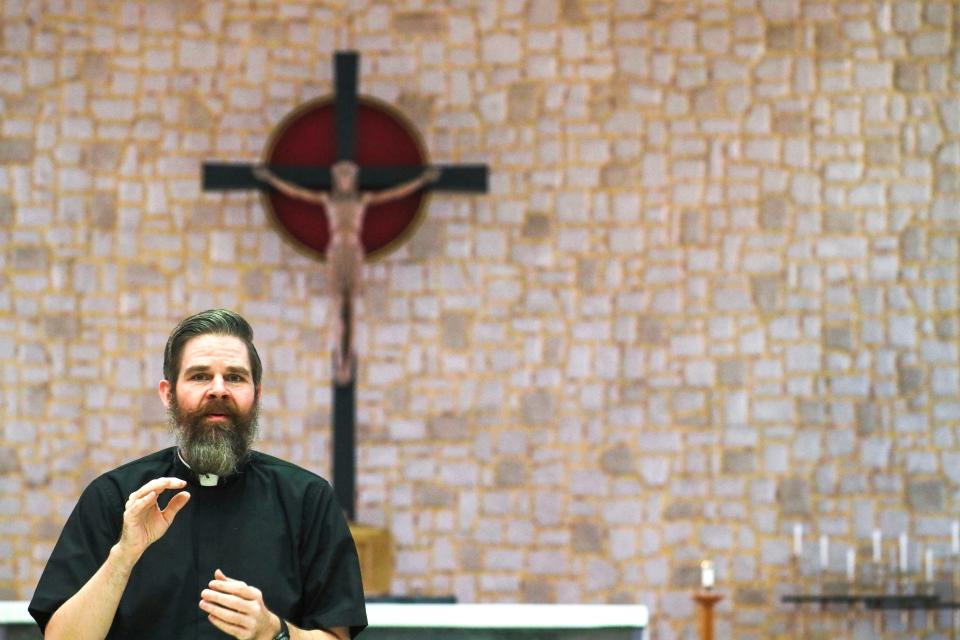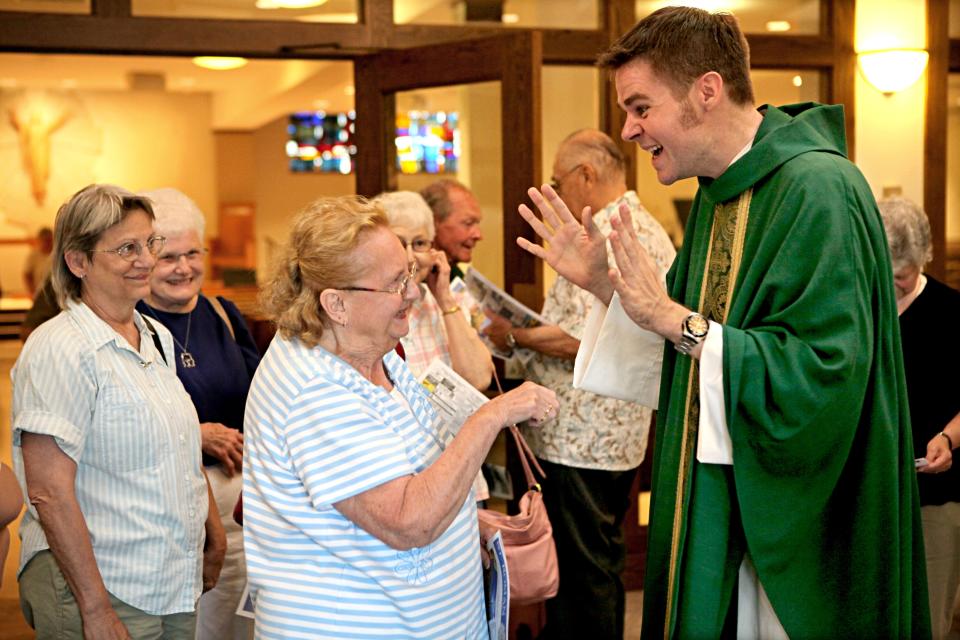Deaf Milwaukee priest works tirelessly to make church more welcoming

The Rev. Christopher Klusman often interacts with people who have never met someone like him before.
To some schoolchildren, he’s the first deaf person they’ve met. They ask questions about how he wakes up in the morning if he can’t hear an alarm clock and if an interpreter follows him everywhere.
To some longtime deaf Catholics, he’s the first priest they’ve seen celebrate a Mass in American Sign Language, having spent 70 or 80 years of their lives looking to interpreters positioned on the side.
In the 10 years since he was ordained in the Archdiocese of Milwaukee, making headlines as one of the nation’s few deaf Catholic priests, Klusman has been dedicated to making sure others who are deaf and hard of hearing can access the church.
“Often, deaf people are overlooked,” he said through an interpreter.
Klusman is director of the Deaf Apostolate for the archdiocese and also serves as chaplain for St. Thomas More High School, where he celebrates all-school Masses and ministers to students.
At its core, the Deaf Apostolate connects people to interpreters and resources in the church. But Klusman’s mission is wider than that. He’s working hard on outreach — to the wider deaf population, which attends religious services in low numbers; to churches, which can be unprepared and unsure of how to accommodate a deaf parishioner; and to the hearing community, which often harbors misconceptions and negative stereotypes about the deaf.
Heart 'lit on fire' at Bible study
Even though he didn’t know it at the time, Klusman’s journey to becoming a priest began with regular drives from Madison to Rockford, Illinois.
A friend he made while studying education at the University of Wisconsin-Madison suggested he attend a Bible study run by Monsignor Glenn Nelson, a priest who was a former teacher for the deaf.
A hearing person, Nelson learned American Sign Language as a young adult and has devoted his life to making the church accessible for the deaf. He is the director of the Deaf Apostolate for the Diocese of Rockford.
When Klusman walked into the room and saw Nelson signing about faith in a way he hadn’t ever seen before, “it was just like butter,” he said.
“I just was able to really connect to the content he was signing about,” he said.
His heart, he said, felt like it was "lit on fire."

Nelson invited Klusman to help in various roles during Masses, such as lector or server. Klusman had never participated actively in Masses before, despite growing up in a churchgoing family, and it gave him a new perspective on his faith, he said.
The trips to Rockford went on to spark a “beautiful mentorship” between Nelson and Klusman. But it wouldn’t be until years later, when Klusman was traveling around Wisconsin teaching deaf students sign language, that the question of entering the seminary came up in conversation.
Nelson asked: Christopher, have you ever thought about becoming a priest yourself?
Klusman said he was shocked, like a deer in headlights. He said: “Well, how? I’m deaf.”
Nelson reassured him it was possible. “If the Lord calls you, then it’ll happen,” Nelson said.
“All of a sudden the blinders came off and I was like, this is meant to be,” Klusman recalled. “I felt God didn’t want me to know before that. It was meant to be at that moment, that time, in my life.”
He preaches deafness as gift from God
Klusman’s ordination in 2011 drew deaf Catholics from across the country, excited about the young, joyful priest’s potential.
After one of his first Masses, a deaf woman in her 80s told Klusman she’d never before seen a priest celebrate the liturgy in sign language. It had always seemed a step removed, her eyes darting away from the rituals at the altar to catch what the interpreter was signing.
Klusman knows that is a common experience for deaf Catholics. The deaf community has something of its own culture, and he is able to connect in a special way.
Deaf people he meets in his ministry work “don’t have to try to explain themselves because I already know what it’s like to be deaf. I lived it,” he said.
Klusman always tries to make his homilies relevant to the deaf community’s rich culture, using stories of deaf people in history or messages that are meaningful to them.
Sometimes that includes lighthearted tweaks to typical themes. He jokes that instead of sheep following the shepherd’s voice, a common motif in Christianity, sheep led by a deaf shepherd would notice his signing hands or would feel the vibrations as he pounded his staff on the ground.
“Deaf people really appreciate that kind of stuff,” Klusman said. “It’s our lives, our culture. It makes a huge, powerful connection to God.”
More Difference-makers: Milwaukee doctor dedicates life to improving Native American health care.
More Difference-makers: Former track star works to make runners safe in all Milwaukee neighborhoods.
It’s so important, he said, to counter stereotypes and negative misconceptions.
Klusman preaches that he sees his deafness as a gift from God. After Mass, Klusman said hearing people often tell him that they used to feel sorry for people who are deaf. They didn’t realize what a fulfilling life deaf people could lead, they say.
And, Klusman said, they find the sign-language Masses to be eye-opening.
When people hear the Mass through an interpreter’s voice, “they have a different experience,” he said. “It’s very impactful and people really like it.”

Churches often unprepared
Another key element of Klusman’s work is making sure parishes are prepared to accommodate any deaf or hard-of-hearing members.
Often church leaders aren’t sure how to find an interpreter or how to make the Mass accessible for the deaf, he said.
Nelson describes churches’ lack of accessibility as a chicken-and-egg situation. Deaf parishioners aren’t likely to stick around at a church without an interpreter. At the same time, a church probably won’t have an interpreter immediately on hand when a new member arrives and asks for one.
Churches have been known to make inadvertent mistakes as they attempt to make accommodations, Nelson said, like sitting an interpreter in front of a window — the backlighting obscuring her fingers — or offering confessions in a dark room, where it’s hard to see the other person signing.
Many hearing people take for granted the ease in which they move through the world, Nelson said.
“The world is hearing and it’s not always deaf-friendly,” he said.
That’s especially true at church services.
Imagine, Nelson often tells people, you arrive at church and you’re asked to sit out in the lobby, where someone repeats to you what the pastor is saying.
“Imagine how that would feel,” Nelson said. “That distance would affect you spiritually.”
It underscores the need for the church to be accessible to all, he said.
“Everybody is a child of God, and everybody needs access.”
That’s the value of an office like the Deaf Apostolate.
“When you have an office that understands the actual needs and the culture itself, now you can really assist everybody,” Nelson said.
At the Deaf Apostolate in Milwaukee, Klusman said he’s been proud to train interpreters in Catholic terminology so that they can interpret the many unique, specific words of the faith accurately and efficiently.
“My hope was to have the deaf community feel included, to feel understood, to feel valued,” he said.
Reaching out to wider deaf community
Klusman is also fueled by a desire to grow the faithfulness of the wider deaf community. “How do I make God's word clear to that deaf community?” he often ponders.
It’s a crucial task rooted in simple statistics, as he sees it.
Only about 1% of the deaf community attends religious services of any kind, surveys show. One major reason is the lack of accommodations.
Coupled with that, at least 95% of deaf children are born to hearing parents, researchers believe. The vast majority of those parents don’t know much American Sign Language, studies show.
“If they do sign, it’s very minimal,” Klusman said. “They just know basic words in order to communicate, basic everyday words, everyday needs, like please, sorry, eat, stop.” It’s hard for those parents to answer questions children might have about life, death and God in an in-depth way, Klusman said.
Klusman is also painfully aware of a dark chapter for the deaf community in Milwaukee involving students at what was then St. John's School for the Deaf. The Rev. Lawrence Murphy, a priest who taught at the Catholic school, is believed to have molested as many as 200 deaf boys during his time there, from 1950 to 1974. The students were often not believed, or ignored, for years by the Archdiocese of Milwaukee, police and prosecutors.
“The deaf community was very wronged,” Klusman said.
From the archives: Documentary details abuse of deaf boys in Catholic boarding school
Klusman recognizes the need for healing. And he hopes to inspire others who are deaf to persevere through challenges and find their faith.
Before he entered the seminary and was working as a traveling teacher for the deaf, Klusman often met children who had never encountered a deaf adult before.
Some had never thought they’d be able to graduate high school or college, he said, lacking successful deaf role models in their lives.
“I really took that experience with me and that has been a huge part of my life and has also influenced me in what I do as a priest,” Klusman said. “My hope is to support more people and encourage more people to join any faith, just to be able to learn God’s word.”
For a list of Catholic parishes in the area that offer signed or interpreted Masses, visit archmil.org/deaf-apostolate.
Contact Sophie Carson at (414) 223-5512 or scarson@gannett.com. Follow her on Twitter at @SCarson_News.
Our subscribers make this reporting possible. Please consider supporting local journalism by subscribing to the Journal Sentinel at jsonline.com/deal.
DOWNLOAD THE APP: Get the latest news, sports and more
This article originally appeared on Milwaukee Journal Sentinel: Milwaukee Catholic priest works to make parishes more deaf-friendly

